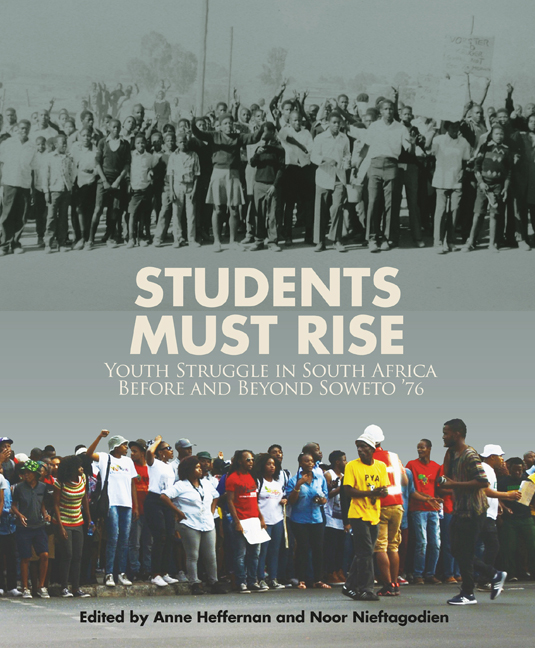Book contents
- Frontmatter
- Acknowledgements
- Contents
- Timeline
- Map Of South Africa
- Glossary
- Abbreviations
- Introduction: narratives of the student struggle
- Chapter 1 A brief history of the African Students’ Association
- Chapter 2 Youth and student culture: Riding resistance and imagining the future
- Chapter 3 The role of religion and theology in the organisation of student activists
- Chapter 4 Student organisation in Lehurutshe and the impact of Onkgopotse Abram Tiro
- Chapter 5 The University of the North: A regional and national centre of activism
- Chapter 6 Action and fire in Soweto, June 1976
- Chapter 7 What they shot in Alex
- Chapter 8 SASO and Black Consciousness, and the shift to congress politics
- Chapter 9 Youth politics and rural rebellion in Zebediela and other parts of the “homeland” of Lebowa, 1976–1977
- Chapter 10 My Journey, our journey: Activism at Ongoye University
- Chapter 11 ‘Let's begin to participate fully now in politics’: Student politics, Mhluzi township, 1970s
- Chapter 12 ‘They would remind you of 1960’: The emergence of radical student politics in the Vaal Triangle, 1972–1985
- Chapter 13 The ends of boycott
- Chapter 14 Fighting for ‘our little freedoms’: The evolution of student and youth politics in Phomolong township, Free State
- Chapter 15 ‘Every generation has its struggle’: A brief history of Equal Education, 2008–15
- Chapter 16 Contemporary student politics in South Africa: The rise of the black-led student movements of #RhodesMustFall and #FeesMustFall in 2015
- Selected Bibliography
Chapter 6 - Action and fire in Soweto, June 1976
Published online by Cambridge University Press: 21 April 2018
- Frontmatter
- Acknowledgements
- Contents
- Timeline
- Map Of South Africa
- Glossary
- Abbreviations
- Introduction: narratives of the student struggle
- Chapter 1 A brief history of the African Students’ Association
- Chapter 2 Youth and student culture: Riding resistance and imagining the future
- Chapter 3 The role of religion and theology in the organisation of student activists
- Chapter 4 Student organisation in Lehurutshe and the impact of Onkgopotse Abram Tiro
- Chapter 5 The University of the North: A regional and national centre of activism
- Chapter 6 Action and fire in Soweto, June 1976
- Chapter 7 What they shot in Alex
- Chapter 8 SASO and Black Consciousness, and the shift to congress politics
- Chapter 9 Youth politics and rural rebellion in Zebediela and other parts of the “homeland” of Lebowa, 1976–1977
- Chapter 10 My Journey, our journey: Activism at Ongoye University
- Chapter 11 ‘Let's begin to participate fully now in politics’: Student politics, Mhluzi township, 1970s
- Chapter 12 ‘They would remind you of 1960’: The emergence of radical student politics in the Vaal Triangle, 1972–1985
- Chapter 13 The ends of boycott
- Chapter 14 Fighting for ‘our little freedoms’: The evolution of student and youth politics in Phomolong township, Free State
- Chapter 15 ‘Every generation has its struggle’: A brief history of Equal Education, 2008–15
- Chapter 16 Contemporary student politics in South Africa: The rise of the black-led student movements of #RhodesMustFall and #FeesMustFall in 2015
- Selected Bibliography
Summary
In the 1960s and 70s Naledi High School was the pride of the sprawling, poor, western-most townships of Soweto. This was a school of students who saw themselves as people who would one day play a key role in uplifting black people. Mr Rudolph Mthimkhulu, the founding principal of Naledi, had instilled in them a sense of purpose, ambition, drive, self-love, and a vision of the possible. His belief in the capability of all children, irrespective of their socio-economic background, was infectious. Mr Mthimkhulu was not going to let any one of us feel comfortable about making excuses for Bantu Education. He insisted that it was precisely because of Bantu Education that we needed to prove ourselves and demonstrate to all that we could do it.
My dream as a young kid at Zola Primary School had been to proceed to Naledi High School, which was in a neighbouring township five minutes’ walk from home. Instead, after finishing primary school, we were marched to a new school named after Dr BW Vilakazi. I hated the school and it was far away, about an hour's walk from home. We suspected that the reason we were marched to Dr Vilakazi was a continuation of the infamous government policy of ‘divide and rule’. Naledi High School was in Naledi township, a predominantly Sotho community, while Dr Vilakazi High School was in a Nguni township – the government discouraged any mixing of the ethnic groups.
When the Department of Bantu Education first had the ridiculous notion of teaching black children through the medium of Afrikaans in 1974, Mr Gqibithole, the principal at Dr Vilakazi, was among the first to agree to implement and test the policy. That first year we all tried very hard to learn. We struggled together with our teachers, who ended up teaching in English and examining pupils’ performance in Afrikaans. Heaven knows how they managed to mark the examination scripts! Many of us failed that year, and we did everything we could to transfer to Naledi High School. This was difficult, because Naledi prided itself on academic excellence and could not take a group of failed students.
- Type
- Chapter
- Information
- Students Must RiseYouth struggle in South Africa before and beyond Soweto ’76, pp. 55 - 64Publisher: Wits University PressPrint publication year: 2016



